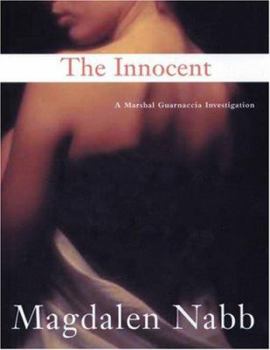Book Overview
It is spring in Florence and everyone around Marshal Guarnaccia seems to be in love, even his own son. The case he is working on, the murder of a young woman, seems to present no particular problems.... This description may be from another edition of this product.
Format:Hardcover
Language:English
ISBN:1569474141
ISBN13:9781569474143
Release Date:October 2005
Publisher:Soho Crime
Length:233 Pages
Weight:0.80 lbs.
Dimensions:0.9" x 5.0" x 7.9"
Related Subjects
Fiction Literature & Fiction Mystery Mystery, Thriller & Suspense Police ProceduralsCustomer Reviews
2 ratings
Marshall Guarnaccia is an Italian Treasure!
Published by Thriftbooks.com User , 15 years ago
Marshall Guarnaccia is one of the best detectives in the lexicon of psychological mysteries, and the series is one of constant and pure pleasure. Beautifully written, the pace is slower as author Nabb demonstrates both the charms and foibles of her adopted city. The Marshall is not at all 'showy'. He is a middle aged, married man who underestimates himself. He is a practical man who appears a bit phlegmatic, but has enormous sympathy with people, whether they be his subordinates, family or suspects. His detection methods are measured and steady: flashy gunbattles rarely arise in any of the novels. The Marshall finds the murder by both steadily following the clues (which are fair to the reader) and through his understanding of the failings of the heart and character of his people. The criticism that Nabb is merely a tourist board member for Florence is not justified. Florence sells itself and Nabb is writing for an English speaking audience that is, presumably, not familiar with her adopted city and its undeniable charms. Like Donna Leon and her Venetian detective (Buonetti? sp?), the city is a major character. Like both of the real cities, the fictional Florence (and Venice!) are seductive. This is the best sort of armchair travel. What makes a good mystery? I have several criteria. The underlying tale has to be plausible, and Nabb never cheats on that score. Nor does she use the terribly obvious red herrings that other writers can clutter up a plot with. Multiple suspects arise in the course of determining if the lover, the employer, the friend or the family of the victim have both the passion and the motive for the crime, and these arise and are eliminated as a seemingly natural occurrence. In Florence, each neighborhood is its own 'village' where everyone knows each other (for good or ill), and the interrelationships make psychological sense. She uses this theme especially well in the Marshall and The Madwoman, but it exists in The Innocent too. She goes further in exploring the family life and concerns of the Marshall in The Innocent which may appeal more to readers of the preceding books in the series, but for the faithful, it is a pleasure. But each book does stand on its own and is a worthy read. A really good mystery has the same requirements as any other writing. Nabb is a master of language, pacing, and evoking a compelling atmosphere. The writing itself is a pleasure and I think I would enjoy reading anything the woman wrote, from books to laundry lists. I am extremely, selfishly sorry that the author died: I could happily read many more stories of the Marshall and his world, his steady pace through his own uncertainties, and his understanding that, at the base of all human action is motive. I enthusiastically recommend this book and the entire series. They are treasures.
Nabb's Marshall Guarnaccia & Florence are both GREAT!
Published by Thriftbooks.com User , 19 years ago
Magdalen Nabb's 13th Marshal Guarnaccia novel THE INNOCENT is the latest episode in her venerable crime series that has been going strong for over two decades. Her two leading characters are her persistent carabinieri NCO, Marshal Salvatore Guarnaccia, and her beloved adopted city, Florence. The story begins with the discovery of a women's body in an out-of-the-way pool in the Boboli Gardens, the expansive park next to the Pitti Palace. This is literally in the good Marshal's back yard since his carabinieri offices and barracks are in a wing of the Pitti Palace. This crime has the usual challenges--identify the victim; determine whether the death was accidental or murder; identify possible motives; look for suspects; and find and arrest the killer. When you read one of Ms. Nabb's novels, you also embark on a wonderful tour of Florence. She always gives special emphasis to the seasons--this one takes place in springtime, late May-early June. The locale is an artisan's quarter in a tiny piazza without a name. This tiny square was formed at the end of World War II, when the retreating German army bombed all the approaches to the Ponte Vecchio, thus making it unnecessary to destroy the historic bridge. Clues lead Guarnaccia to this artisan's quarter where we get wonderful insights into the plight of these artisans and the sustainability of their crafts in the 21st century. We get to know the shoemaker, the furniture restorer, and the local restaurant owner who caters to the workers instead of the tourists. Their apprentices are no longer the young upwardly mobile Italians, but foreigners from as far away as Japan. Ms. Nabb is unique in featuring the carabinieri in her books--and not the state police favored by her colleagues like Donna Leon and Michael Dibdin. Unlike Commissario Guido Brunetti or Inspector Aurelio Zen, Marshal Guarnaccia has a close day-to-day relationship with the people in his neighborhood jurisdiction. So when a murder occurs, he has already established a sense of trust with them, and this always helps in the solution of the crime. In this book, we get an insight into Guarnaccia's relationship with the young carabinieri recruits he commands; and his relationship with his two teenage sons. Typically he feels inadequate in both tasks! This wonderful novel is a social commentary on modern day Italy as well as an entertaining crime story.






